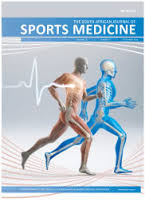Expert consensus on the terminology, diagnostics and management of persisting symptoms after concussion with a focus on mental health, postural stability, electroencephalogram and balance testing: A cross-sectional Delphi-like survey
DOI:
https://doi.org/10.17159/2078-516X/2024/v36i1a17870Abstract
Background: Persisting symptoms after concussion (PSaC) are a pathological manifestation of head injuries that present with symptoms after the acute phase of head trauma has subsided. Insufficient research about PSaC has led to gaps in knowledge and incorrect terminology being applied. Furthermore, gaps exist in standardised assessment protocols and understanding of mental health symptoms associated with sports.
Objectives: The study aimed to; 1) Determine expert consensus on appropriate terminology for symptoms lasting >4 weeks, 2) Investigate associations with mental health and postural stability symptoms, 3) Evaluate experts’ views on quantitative balance and electroencephalogram (EEG) testing.
Methods: A Delphi-like survey was designed in REDCap and sent to identified experts in the field of sports-related concussions (SRC). Expert consensus was defined as ≥ 75% agreement.
Results: Expert consensus identified the following mood and motor control symptoms being associated with PSaC: increases in emotional state (80%), irritability (87%), nervousness (87%), sadness (80%), balance impairment (80%), dizziness (87%) and feeling slow (80%). Numbness and tingling were not considered longer-term effects (80%). Additionally, 93% of respondents acknowledged mental health symptoms as potential longer-term effects, with 80% agreeing on inadequate current management. Respondents indicated PSaC are only somewhat adequately managed (73%) or not managed well enough (27%). The use of EEG and quantitative balance testing remains open for debate. The survey response rate was 21%.
Conclusion: Improving mental health management for athletes with PSaC and standardising terminology is crucial. Future research is required to establish effective diagnosis and treatment methods. Addressing these issues may result in better care and safer return to play for athletes.
Downloads
Downloads
Published
Issue
Section
License
Copyright (c) 2024 South African Journal of Sports Medicine

This work is licensed under a Creative Commons Attribution 4.0 International License.
The South African Journal of Sports Medicine reserves copyright of the material published. The work is licensed under a Creative Commons Attribution 4.0 (CC BY 4.0) International License. Material submitted for publication in the South African Journal of Sports Medicine is accepted provided it has not been published elsewhere. The South African Journal of Sports Medicine does not hold itself responsible for statements made by the authors.
How to Cite
- Abstract 578
- PDF 333
- PDF (Supplementary) 58





.png)